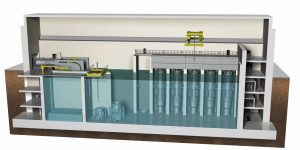 Given the slow and somewhat painful shutdowns of perfectly good operating nuclear plants due to competitive pressures from low priced natural gas and subsidized solar and wind generation, is there a future for new nuclear power plants? The recent experience of cost overruns and schedule delays associated with the 4 large (1200 Mwe) nuclear plants being built now in Georgia and South Carolina is not reassuring. Actually, the two in South Carolina have been essentially canceled by the owners due to these cost overruns and lack of electricity demand.
Given the slow and somewhat painful shutdowns of perfectly good operating nuclear plants due to competitive pressures from low priced natural gas and subsidized solar and wind generation, is there a future for new nuclear power plants? The recent experience of cost overruns and schedule delays associated with the 4 large (1200 Mwe) nuclear plants being built now in Georgia and South Carolina is not reassuring. Actually, the two in South Carolina have been essentially canceled by the owners due to these cost overruns and lack of electricity demand.
While natural gas is cleaner than coal from an emissions standpoint, nuclear energy does not emit any CO2 or other noxious gases. As we seek to reduce these emissions, nuclear energy as a baseload source of electricity is needed. Until massive new storage technology is invented and deployed, there is no other clean energy alternative available on a 24 hour, 365 day basis.
So what can we do? Small modular reactors (SMR) are now being designed and licensed in the US which could address some of the fundamental problems of large nuclear plants. These problems include the huge capital investment required for new plants as well offloading large increments of power all at once (1200 Mwe) during a period of slow demand growth. The improved inherent safety design of SMR’s however create cost reduction opportunities without compromising safety. Additionally, due to the small size of SMR’s, they can be modularized allowing for faster construction. These SMRS can also be built to meet electricity demand in increments typically needed.
Despite all these advantages, the problem with these SMRs is the cost of power is higher than that of a large light water reactor due to their small size. Should these plants enter the market however, the speed of construction and factory manufacture of modules could make the plants competitive due to the economy of mass production. The tough part is getting enough early orders to get the mass production going. If we are going to have a cleaner more reliable energy future, small modular reactors are one hope of doing so. In order to cost effectively deploy these SMRs, regulatory changes in staffing, security, and design requirements are needed that recognize the safety these plants provide.
Dr. Kadak, thank you for bringing these questions up for discussion. The quick response to your three points would be yes, yes, and yes. I think it’s important to note… Read more »
While nuclear power is low carbon, and therefore much safer than fossil fuel power plants, nuclear has a number of important drawbacks: 1) It’s expensive. Renewable energy prices are dropping… Read more »
Dan, your arguments don’t seem very convincing. If I might take them one by one: 1) You speak as if you can compare renewables and nuclear on an even footing,… Read more »
Tom: Thanks for your reply. Believe it or not, I am not anti-nuclear. I believe nuclear plants are 1000 safer than coal plants and that fossil fuels are the most… Read more »
Thanks for that reply, Dan. I really think these issues will be settled only when we get a truly advanced reactor design up and running. Fortunately that will likely happen… Read more »
Tom: We are quickly heading to $0.02/kWh for renewable electricity (without storage) and it may be $0.01 in 10 years when you say these SMRs may be available. What is… Read more »
Dan, for some reason there was no reply button on your last post asking about the price. It could be down around 2¢, but again you’re comparing apples and oranges.… Read more »
Tom: Thanks for your reply. While I agree that nuclear is low-carbon and that’s where we need to go, I don’t agree with your assessment that storage is the only… Read more »
Dear Dan, You may want to re-examine the “too cheap to meter” fiasco so that proponents of renewable energy don’t fall into the same trap. When you say we are… Read more »
Herschel: Some quick replies: 1. $0.02/kWh is already being approached in some parts of the world. US prices are higher for a variety of reasons, but the trend is still… Read more »
As reported by the UN, the world is failing to meet GHG reduction goals to prevent the severe effects of climate change . There are a number of reasons for… Read more »
Another perspective: Even though Small Modular Reactors (SMRs) may be more expensive to operate than existing light water reactors, this new class of technology may add a resilience benefit that… Read more »